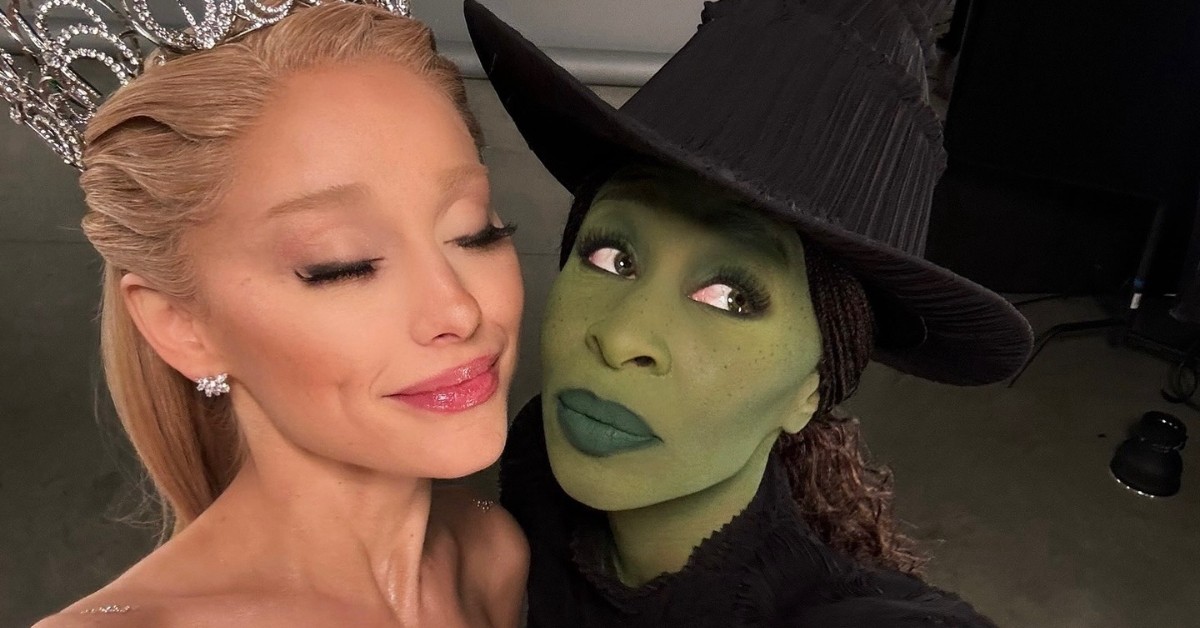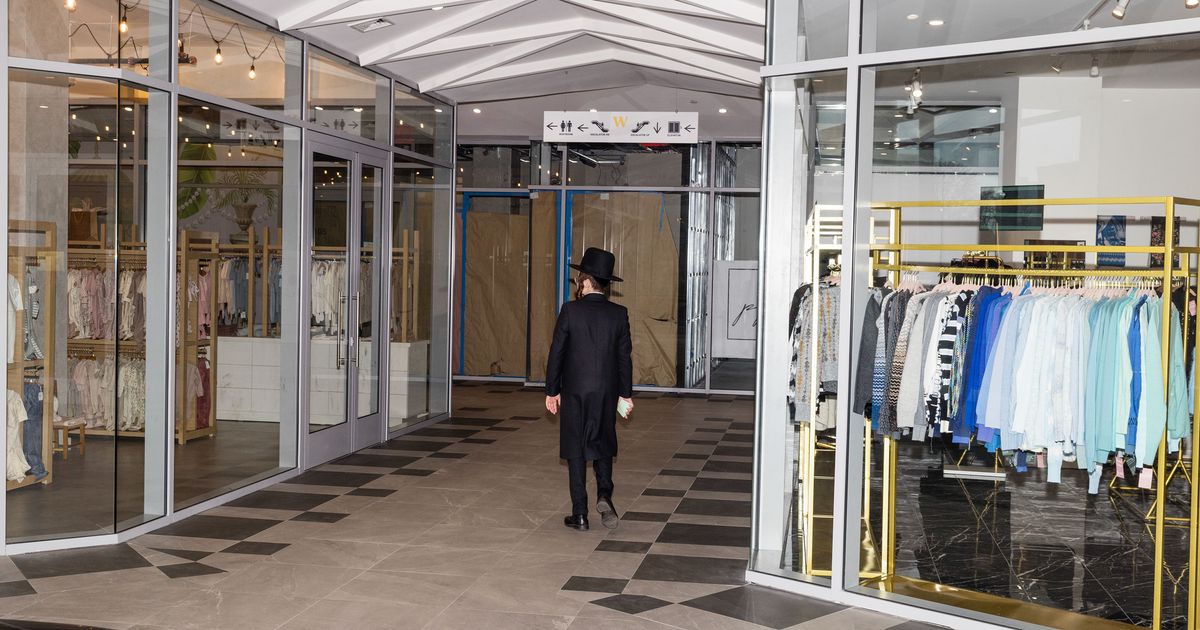
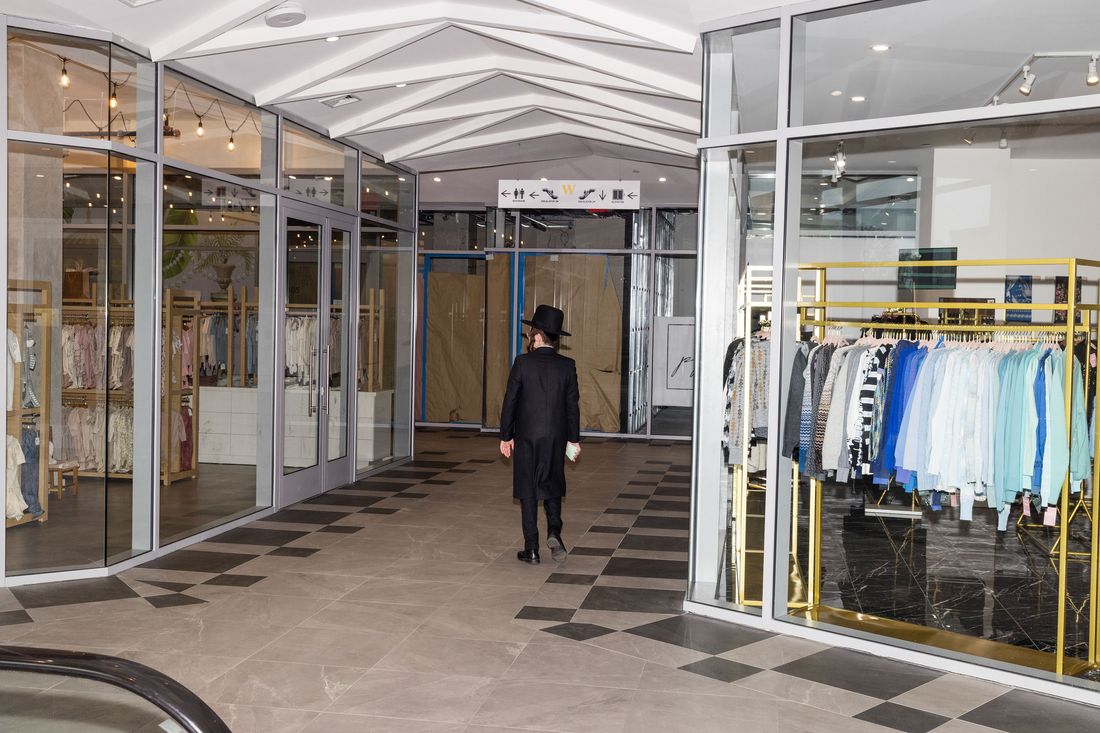
“It’ll be nice in winter,” Zissi is telling me, her sheitel-and-headband combo sparkling. “And it’s nice not worrying about the food being kosher or the clothes being modest.” We’re in the food court of the W Mall, its name short for “Williamsburg,” a brand-new glassy box on Flushing Avenue. Developed by the Brooklyn real-estate macher Joseph Brunner, whose Bruman Realty rental empire extends from Bed-Stuy to Bushwick to Downtown Brooklyn, it’s uniquely designed explicitly for one religious community, the Satmar Hasidim of Brooklyn. Nearly every shopper I see is a woman in the neighborhood uniform of a long, modest skirt, a headwrap or a sheitel (the wig worn by married women) covered with a jaunty cap or headband, opaque tights, and flats, pushing a baby carriage. The food court is not a mishmash of restaurants but rather one singular W-branded hydra that provides a range of dairy-only offerings so as not to mix milk and meat, including the signature Orthodox combo of pizza and sushi.
Hasidic shoppers in Williamsburg almost exclusively patronize mom-and-pop shops, the local ones along Lee Avenue and the adjacent streets that sell shoes and kosher poultry and Judaica and more. W Mall offers consolidation, and because nobody wants unnecessary shlepping, the mall, despite its newness, has gained immediate popularity. In the food court, knots of women are chatting in Yiddish, one of them celebrating a grandmother’s birthday.
Though a few stores have been open for months, two of the three floors are now fully operational with 20-plus shops and more than 50,000 square feet of retail. Some areas are still not quite fully baked; alongside a kids’ play area in the basement is an unfinished-concrete box of a room for stroller parking, right next to the kosher-certified cotton-candy machine. In the shops, modest clothing is abundant in stores like Pleats (“Skirts for every season, for every reason”), Think Closet, Runway, and Camomille [sic]. Some of the businesses are exclusive to the W, but some have branches in other Orthodox enclaves like Monsey and Borough Park.
A discreet lingerie store, La Plume, offers phalanxes of the floor-length “Shabbos robes” beloved by Hasidic women who, after making the monumental effort to prepare Sabbath meals for large families, just want to hang out in a loose, comfortable garment — plus some extremely sturdy-looking bras, nylon slips, long-sleeved floor-length silky bathrobes, and lacy underwear. A female employee engages in a hushed consultation with a client who emerges with a faint smile and an armful of heavily wrapped packages. I wisely stay quiet here because in several other stores — including a gift shop for all Hasidic occasions, a modest-skirt boutique, and a baby-clothes shop — I get gently kicked out for “bothering the customers.” I’m in a long black skirt and long-sleeved cardigan, but I no more “pass” than if I were wearing a tank top and miniskirt. I was raised Orthodox enough to have eaten at many pizza-and-sushi restaurants, but Teaneck Modern Orthodox isn’t Williamsburg Hasidic, no matter how hard you broaden your vowels. My Russian is good, which helps in conversation with several shop owners, but my Yiddish is not, which is a barrier to conversing with customers. Almost no one I talk to will share a last name.
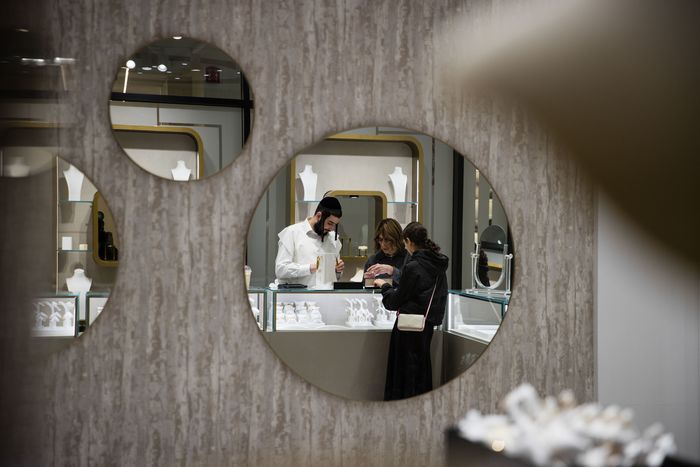
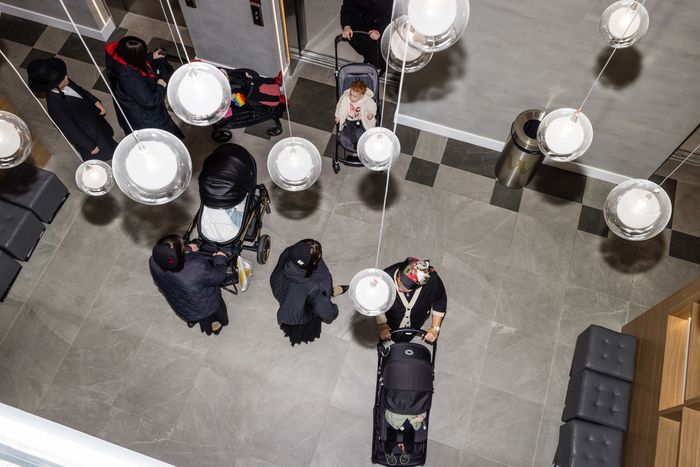
Shopping at Jewelry Master; the common spaces of the W Mall, where large families mean a lot of strollers. Photos: Jackson Krule.
Shopping at Jewelry Master; the common spaces of the W Mall, where large families mean a lot of strollers. Photos: Jackson Krule.
This is an upscale and fairly expensive place. One headband to adorn a sheitel will set you back $125 at Frank Olive, and the black knit hats on the table, eyed by customers wearing nearly identical pieces, run into the hundreds. As Malka, manager of the Mauve Spa (“A spa glows in Brooklyn”) on the second floor, explains, this is a place for Hasidic women to get away from the stresses of managing big households and engage in a bit of luxury. That’s why the spa offers private rooms for its mani-pedis and electrolysis — and unlike in the rest of the mall, free-roaming kids are not allowed. “The moms just want to relax and have some quiet time,” Malka explains.
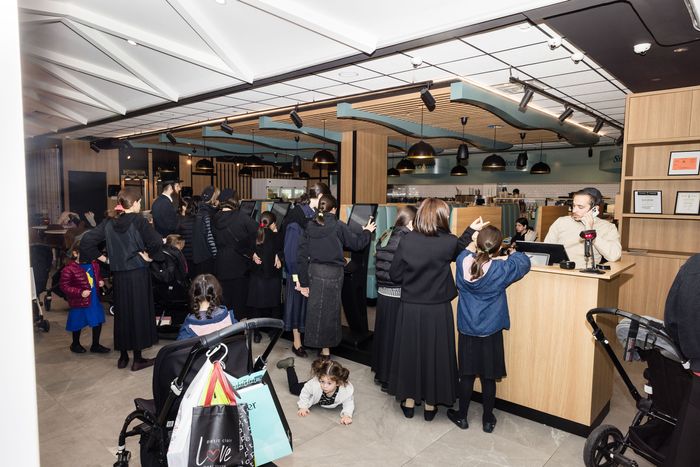
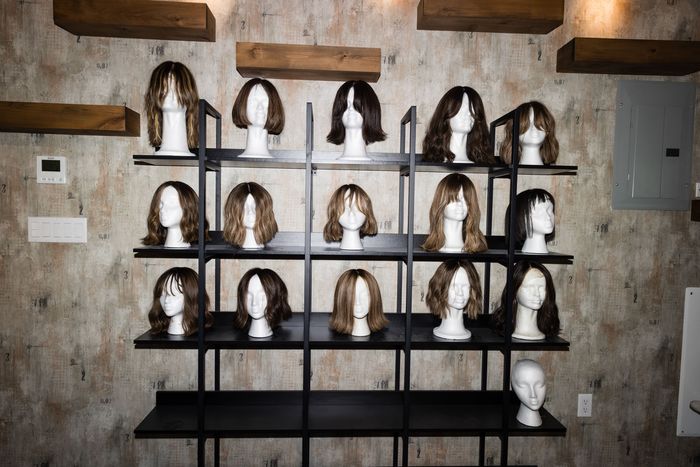
In the food court, and at Raizy Klein’s W Wig Salon. Photos: Jackson Krule.
In the food court, and at Raizy Klein’s W Wig Salon. Photos: Jackson Krule.
One level up, things get interesting: On opposing sides of the floor, it’s a tale of two hair salons. One is Rêve Rosé Salon, run by Yelena Kalendareva, who tells me she has been working with Hasidic women primarily in Borough Park since 2006. It’s a lush pink dream with Barbie-hued salon chairs and a signature hair-relaxing treatment. Kalendareva also does perms on boys’ side curls, though no boys are in evidence. Teaming up with a rabbi in Queens, she has also created a line of Jewish-law-approved “Shabbos makeup,” which uses powders-only, non-layered cosmetics to get around prohibitions against ordinary makeup on the Sabbath. As a stylist, she serves only unmarried Hasidic women “from 6 to around 22,” who don’t yet cover their hair.
If you’re married — and thus bewigged and, in some sects, with your hair shaved beneath — you’ll have to cross the third floor to W Wig Salon by Raizy Klein (“Always hair for you”), where dozens of sheitels are draped over mannequin heads or left to dangle from wire racks. The wig is both required for a married woman’s modesty and a serious financial investment. According to Goldy, a manager dressed in a floor-length silver-gray pleather gown, a typical selection at W Salon is at least $2,000. Which is why the salon also offers a range of services to help it last: wigs-only highlights, washing, setting, trendy cuts, and dye services, starting at around $250. Goldy talks prices with me while curling a customer’s wig with an iron; the woman stares out the window, blissed out, at the rush of traffic below.
Photo: Jackson Krule
link

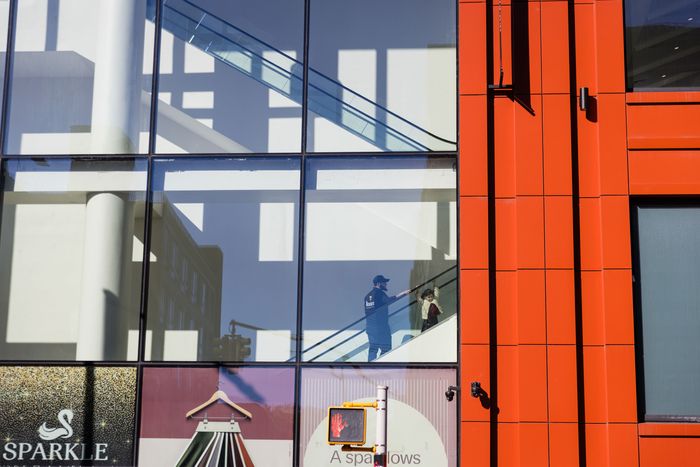




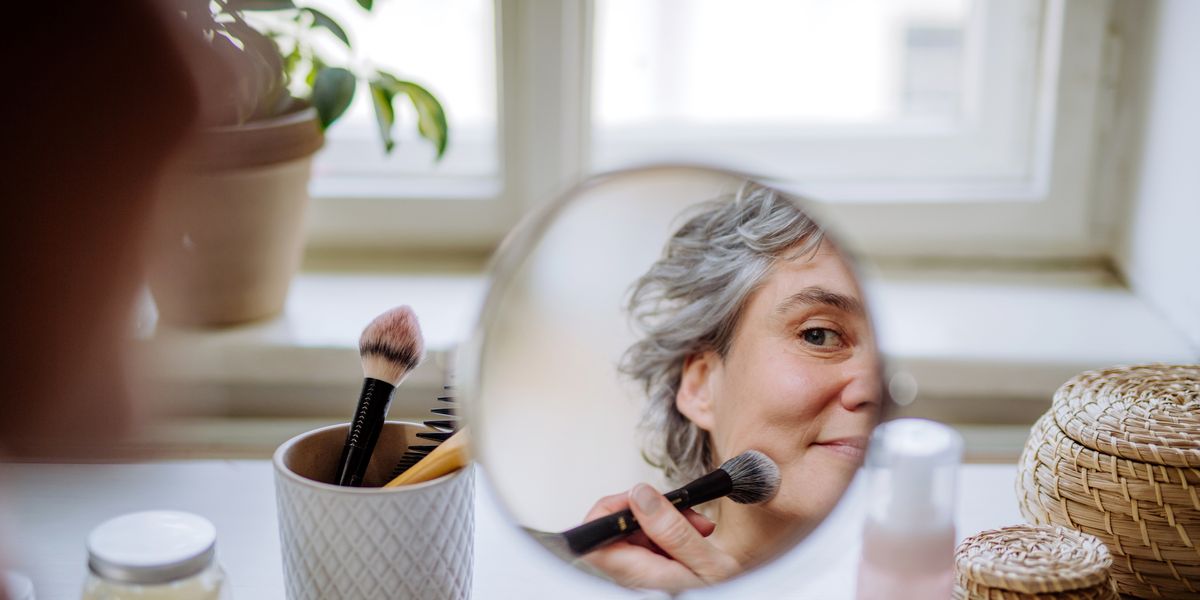
:max_bytes(150000):strip_icc():focal(2999x0:3001x2)/peo-expert-picked-spring-fashion-trends-tout--3e83e842a1a34660b490259601fd451a.jpg)
